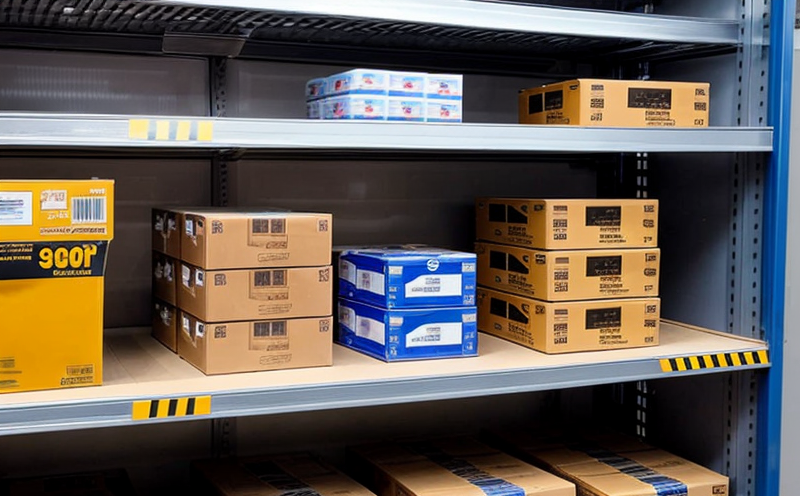ASTM D5276 Drop Testing of Shipping Containers
The ASTM D5276 drop testing standard is a critical component in ensuring the integrity and reliability of shipping containers used in the medical device industry. This test simulates real-world conditions to evaluate how effectively packaging can withstand potential impacts during transport, thereby safeguarding the safety and efficacy of medical devices.
Drop testing under ASTM D5276 focuses on assessing the impact resistance of a container by subjecting it to controlled drops from various heights. The primary goal is to determine if the container will protect its contents against damage due to accidental impacts that may occur during shipment. This service is especially important for medical devices, where even minor damage can compromise product integrity and patient safety.
The testing procedure involves placing a specimen of the shipping container in a controlled environment before subjecting it to drops from different heights using specialized drop test equipment. The height from which the container is dropped depends on its intended use and the anticipated impact forces during transport. The ASTM D5276 standard provides specific guidelines for this, ensuring that tests are conducted under consistent conditions.
Once the specimen has been subjected to the predetermined drop heights, it undergoes a thorough inspection for any signs of damage or failure. This includes checking for cracks, dents, deformations, and other visual indications that could compromise the container's structural integrity. If the container passes this inspection phase without sustaining significant damage, it is deemed suitable for further transport.
The results of the drop test are crucial in determining not only the reliability of the shipping containers but also the overall quality control measures implemented by manufacturers. By adhering to ASTM D5276 standards, companies can ensure that their products meet regulatory requirements and customer expectations regarding safety during shipment.
Moreover, these tests play a vital role in minimizing risks associated with potential recalls or product failures caused by improper packaging. Ensuring compliance with such standards helps manufacturers build trust with customers while maintaining high standards of quality assurance throughout the supply chain.
In summary, ASTM D5276 drop testing is an essential process that guarantees the integrity and safety of medical device shipments by simulating realistic impact scenarios encountered during transportation. Its rigorous procedures help identify potential weaknesses early on so corrective actions can be taken before products reach end-users.
- Simulates real-world conditions to evaluate how effectively packaging can withstand impacts during transport
- Evaluates the container’s ability to protect its contents against damage due to accidental impacts
- Ensures compliance with regulatory requirements and customer expectations regarding safety during shipment
- Helps identify potential weaknesses early on so corrective actions can be taken before products reach end-users
Eurolab Advantages
Eurolab offers unparalleled expertise in ASTM D5276 drop testing, providing comprehensive support to our clients across various sectors including medical devices. Our team of experienced professionals ensures that all tests are conducted meticulously and consistently with industry best practices.
We employ advanced equipment and state-of-the-art facilities designed specifically for performing these types of evaluations. This allows us to deliver accurate results quickly, allowing you to make informed decisions about your product packaging right away.
Our commitment to quality goes beyond just meeting standards; we strive to exceed them by continuously improving our processes through research and development initiatives aimed at staying ahead of changing regulatory landscapes. By partnering with Eurolab for ASTM D5276 drop testing, you gain access not only to technical excellence but also strategic insights that can help drive innovation within your organization.
Why Choose This Test
Environmental and Sustainability Contributions
Evaluating the impact resistance of shipping containers is crucial not only for ensuring product safety but also for promoting environmental sustainability. By identifying packaging that can better protect products from damage during transport, we help reduce waste associated with damaged goods, thereby conserving resources.
The rigorous testing process employed in ASTM D5276 ensures that the chosen containers are capable of enduring various stressors encountered throughout their journey. This reduces instances where products have to be discarded or returned due to improper packaging, which would otherwise result in unnecessary consumption of raw materials and energy.
Furthermore, by adhering strictly to international standards like ASTM D5276, manufacturers can demonstrate their commitment to sustainable practices. Such certifications add value to companies' reputations, making them attractive partners for environmentally conscious consumers and organizations alike.
In conclusion, incorporating ASTM D5276 drop testing into your quality assurance protocols not only enhances product safety but also contributes positively towards reducing environmental footprints in the medical device industry.





